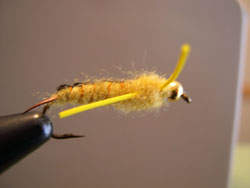
Alberta Stone

Hook: Size #6-10 Streamer
Tail: Brown Goose Biots
Wing Case: Ringneck Pheasant Tail
Shellback: Ringneck Pheasant Tail
Body & Thorax: Golden Stone Dubbing
Legs: Golden/Yellow Round Rubber Hackle
Ribbing: Fine Copper Wire
Head: Gold Cone head/Bead head

Step 1: Slide the bead head to the eye of the barbless hook. Wrap
the thread to the end of the hook.

Step 2: Wrap a small ball of dubbing at the end of the hook, and tie
in your goose biots for the tail.

Step 3: Tie in enough strands of pheasant tail to make a nice back
for the fly. Tie in a long enough piece of fine copper wire as
well.

Step 4: Wrap in the golden stone dubbing to form the body of the
fly. Make sure it tapers wider as you go towards the eye of the
hook. Stop about 2/3 the way up the hook

Step 5: Bring the pheasant tail strands from the back to where you
stopped with your thread. Tie down the pheasant tail, and wrap
the copper wire from the back of the hook as well. Make about
5 wraps, and tie off.

Step 6: Tie in your rubber legs on each side of the hook.
Silly legs or rubber round "hackle" can be used.

Step 7: Loosely wrap in the golden stone dubbing to form the thorax
of the fly, and then bring the rest of the pheasant tail and wrap
over the thorax to the bead. Tie off the pheasant tail behind the
bead. This forms the wing case over the thorax.

Final Step: Whip finish the fly, trim the legs to a desired length,
and the fly is done! This fly is a fantastic nymph pattern from big
rivers to small streams. It imitates the golden stonefly nymph very
closely, and catches a lot of fish when most other patterns are not
working. This fly can be fished from early spring to late summer
with incredible results. Tie some up, and see for yourself!
Tight lines!
Fly Tied By: Tim Tchir
Pattern By: Phil Rowley